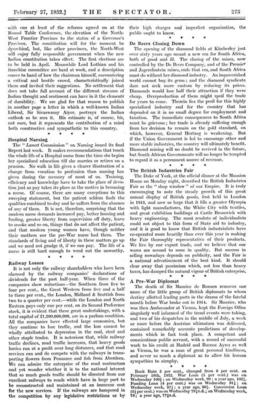Railway Losses
It is not only the railway shareholders who have been alarmed by the railway companies' declarations of dividends for the past half-year. When three of the companies show reductions—the Southern from five to four per cent., the Great Western from five and a half to three per cent., the London, Midland & Scottish from two to a quarter per cent.—while the London and North Eastern pays only one per cent. on its Second Preference stock, it is evident that these great undertakings, with a total capital of £1,200,000,000, are in a parlous condition. All the companies have effected large economies, but they continue to lose traffic, and the loss cannot be wholly attributed to depression in the coal, steel and other staple trades. It is notorious that, while railway traffic declines, road traffic increases, that heavy goods lorries run at a profit over long distances, and that road services can and do compete with the railways in trans- porting flowers from Penzance and fish from Aberdeen. We can admire the enterprise of the road contractors and yet wonder whether it is to the national interest that so much goods traffic should be directed from our excellent railways to roads which have in large part to be reconstructed and maintained at an immense cost for the new services. If the railways are hampered in the competition by any legislative restrictions or by
their high charges and imperfect organization, the public ought to know.
* * * *


































 Previous page
Previous page